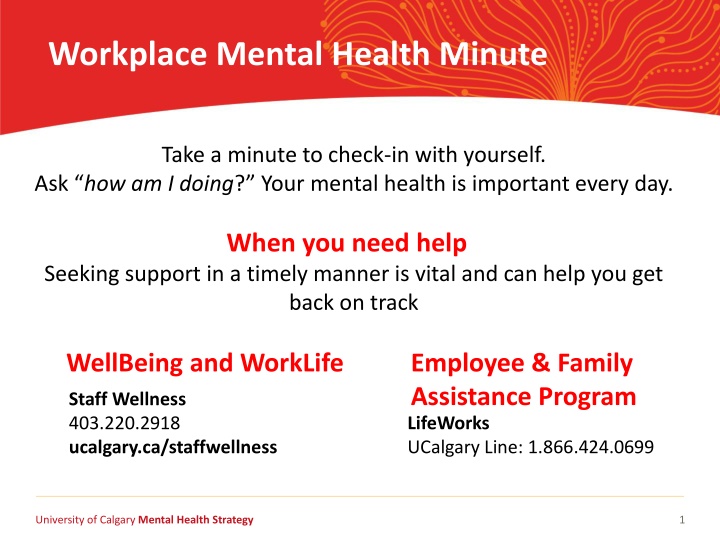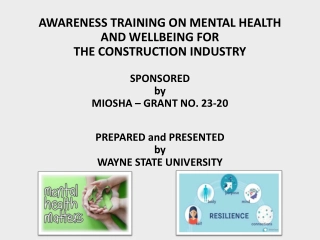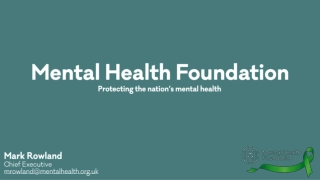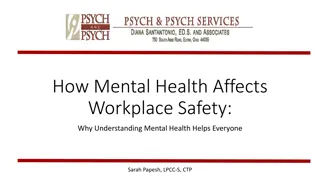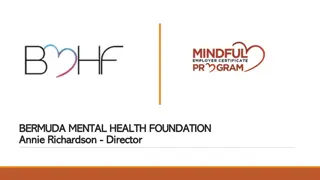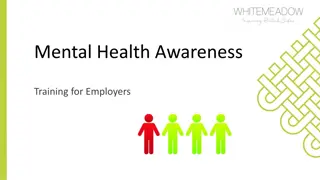Workplace Mental Health Strategies
It's essential to check in with yourself regularly and prioritize your mental health in a supportive work environment. Learn about stress management, physical activity, media intake monitoring, creating structure, and planning self-care.
Download Presentation

Please find below an Image/Link to download the presentation.
The content on the website is provided AS IS for your information and personal use only. It may not be sold, licensed, or shared on other websites without obtaining consent from the author.If you encounter any issues during the download, it is possible that the publisher has removed the file from their server.
You are allowed to download the files provided on this website for personal or commercial use, subject to the condition that they are used lawfully. All files are the property of their respective owners.
The content on the website is provided AS IS for your information and personal use only. It may not be sold, licensed, or shared on other websites without obtaining consent from the author.
E N D
Presentation Transcript
Workplace Mental Health Minute Take a minute to check-in with yourself. Ask how am I doing? Your mental health is important every day. When you need help Seeking support in a timely manner is vital and can help you get back on track WellBeing and WorkLife Employee & Family Assistance Program Staff Wellness 403.220.2918 ucalgary.ca/staffwellness LifeWorks UCalgary Line: 1.866.424.0699 University of Calgary Mental Health Strategy 1
Stress, Job Performance & Wellbeing You are not alone. Did you know that 51% of Canadians experience high job stress. Learn how to create a supportive work environment and to maintain your own mental health and wellbeing! Staff Wellness offers these workshops: The Working Mind Building Personal Resilience Building Resilience through Connection University of Calgary Mental Health Strategy 2
Remain Physically Active Physical activity can improve cardiovascular health, mobility, longevity, sleep, mental health and more. Access Active Living for vclasses and registered programs. Take micro-breaks from your computer stretch, walk, grab a glass of water. Contact Staff Wellness to learn more about ergonomic workshops. If working from home, integrate walks into your day to simulate the daily movement we get on campus. University of Calgary Mental Health Strategy 3
Monitor Media Intake Staying up-to-date and informed is important to our physical health but too much information can have unintended impacts to our mental health. Things to consider: Be selective and look for credible, fact-based news sources. Set limits around the amount of time you check-in with your sources during the day and limit how long you spend in these spaces. Look for positive, inspiring and hopeful news. University of Calgary Mental Health Strategy 4
Implement Structure and Routine Creating structure and routine in our day can help reduce stress by : freeing up cognitive resources overriding rumination and worry focusing on positive, productive pursuits adding to feelings of control Strategies to consider: Schedule mental and physical breaks throughout the day Create realistic and achievable daily task list(s) Designate, plan and prepare specific self-care activities University of Calgary Mental Health Strategy 5
Plan Self-Care When busy and settled into routines, don t lose sight of self-care. Proactively seek-out and schedule self-care strategies to move us through the semester. Take time for mindfulness. Breathing, meditation and yoga are all important activities that promote being present. Eat well. choosing healthy and nourishing foods Focus on restorative sleep routines. University of Calgary Mental Health Strategy 6
Practice Compassion We're in the same storm on different boats. Try to recognize everyone is going through this moment under varying circumstances. Your own reactions and emotions are okay, as are others. Communicate your comfort level to those you interact with and encourage others to do the same. University of Calgary Mental Health Strategy 7
One day at a time The uncertainty that we are coping with is a significant challenge. Instead of ruminating on the past or worrying about the future, be mindful of the present moment. This can help us focus on our own emotions and what we can control. University of Calgary Mental Health Strategy 8
Reach out for Support Although heightened stress during the COVID-19 response is not uncommon, support is available for you to discuss your feelings. If fear or stress is impacting your ability to participate or complete daily tasks, or activities, reach out to your community friends, family, faith, or through counselling or crisis lines. Employee and Family Assistance Program LifeWorks UCalgary Line: 1.866.424.0699 University of Calgary Mental Health Strategy 9
